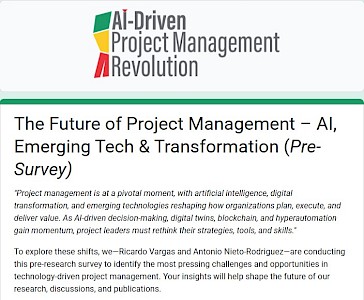Issue #16 - Understanding The Hidden Costs That Will Destroy Our Projects
Hey everyone!
The latest edition of our newsletter is out, and this time, we’re diving deep into the hidden costs that can jeopardize our projects. We’ll explore how to avoid financial pitfalls, understand the impact of large-scale tech investments, and discover strategies for more efficient and sustainable project management.
In this issue, we take a closer look at the growing influence of AI in project management, the groundbreaking advancements of DeepSeek in the tech world, and the launch of Harmony—an AI-powered project manager set to revolutionize the industry.
Plus, we’re conducting a survey on the future of project management with emerging technologies. Your insights will help shape what’s ahead in 2025.
Happy reading!
Ricardo Vargas

In This Issue
- How to Avoid Hidden Cost Pitfalls
- DeepSeek: The Chinese AI Startup That is Shaking the AI World
- The Future of AI According to World Economic Forum: What WeLearned at Davos
- Volatility at Unprecedented Levels
- The Launch of Harmony: Your AI Project Manager
- Pre-Survey about The Future of Project Management – AI,Emerging Tech & Transformation
- Exciting Updates on AIPM Certification and the Masterclass
How to Avoid Hidden Cost Pitfalls
Some say, "Cooking at home is free compared to eating out."
But that's a fallacy.
Your time is not free. Every hour spent cooking is an hour you could have used productively elsewhere (imagining you are not cooking for pleasure). Essentially, you are "paying" yourself to cook.
The same logic applies to chores around the house. Just because you're not paying someone else to clean doesn't mean there isn't a cost to your time, energy, and perhaps even your mental well-being.
This is the difference between expense and cost: Expenses require a cash outflow. Costs include time, energy, and lost opportunities.
Many projects fail because they ignore this fundamental distinction.
We've all seen projects that went over budget, not because they underestimated the price of materials but because they didn't account for the total cost, which includes time, resources, and long-term operational needs.
I've seen this happen firsthand in large-scale projects and several humanitarian projects during my time at the United Nations.
I witnessed courthouses built in regions without electricity grids.
What's the point of constructing walls, doors, and furniture if the building can't even be powered? This isn't theoretical — it's a real mistake that has happened.
I've also seen maternity hospitals built without accessible roads, making the medical facilities inaccessible to those needing them most. Even advanced medical equipment couldn't help if the patients couldn't physically reach the facility.
Or consider solar panel projects placed in regions with severe sandstorms, like the Sahel and the Sahara Desert. The result? Astronomically high maintenance costs due to constant cleaning and damage from sand abrasion.
These are all cases of poor cost estimation, where planners considered only visible expenses, ignoring long-term sustainability.
These are all cases of poor planning — where only the obvious expenses were considered, and the long-term operational costs were ignored. In all these cases, the projects would have benefited from a more holistic cost analysis.
Another example that came to my attention recently was the new project announced by the U.S. government, alongside OpenAI and other major investors, called Stargate Project — a potential $500 billion data center initiative.
To put that into perspective, this investment is larger than the entire GDP of most countries. In fact, only around 25 nations have a GDP exceeding $500 billion, meaning this single AI infrastructure project surpasses the economies of roughly 85% of the world's countries.
Naturally, people see this as an incredible advancement. A giant leap forward.
But here's a dimension that few are considering: the hidden costs.
Just as an example, when we think about a massive data center, we think of servers, chips, and infrastructure. But what about energy consumption and running costs?
These data centers often consume more electricity than entire cities, which comes with a significant environmental footprint and a potentially massive energy bill.
Just this year, reports emerged that AI data centers are driving a surge in electricity demand, forcing nations to rethink their power grids.
In some areas, this spike in demand is pushing national power grids to their limits.
Governments are grappling with how to balance AI's energy hunger while still maintaining reliable power sources for everyday needs.
We often underestimate the actual costs of what seems simple or even "free".
So, how can we avoid falling into these traps? How can we ensure that we don't make the same mistakes? Here are some strategies that can help.
- Differentiate between cash outflow and actual cost.
Just because something doesn't require immediate spending doesn't mean it's free. Internal training, for example, still has a cost — the employees' time, the office's electricity, and the use of company resources.
The same applies to "free" online courses — the time you spend studying is a "cost."
- Quantify all costs — both direct and indirect.
If a five-person team with an average salary of $1,000 per month undergoes training, and each person works 200 hours a month, their hourly cost is $5.
A four-hour training session must consider the $100 of indirect personal costs before even factoring in the price of the trainer, venue, and materials. It is critical that we always calculate the whole picture.
- Decide strategically: build or buy?
It's often better to outsource when you lack strategic interest in acquiring the knowledge in-house, the technology is proprietary and cannot be developed internally, or the total internal cost of doing it yourself exceeds the cost of buying a ready-made solution.
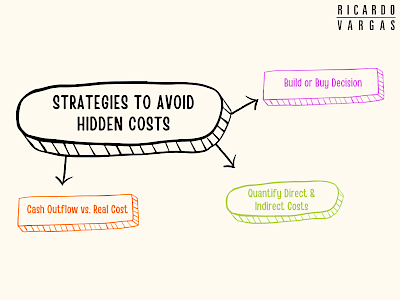
Strategies to Avoid Hidden Costs
This cost fallacy is not limited to grand infrastructure projects. It's something we face in our everyday lives.
Driving your own car may seem cheaper than using an Uber. But when you factor in fuel costs, wear and tear on your vehicle, maintenance, and the value of your time (especially during heavy traffic), it may be more cost-effective to take a ride-sharing service.
You might assume cooking at home is cheaper than ordering a meal from a restaurant. But if your time is valuable, it might actually cost more to cook, factoring in the time spent shopping, prepping, cooking, and cleaning up.
Many people take on DIY projects with the goal of saving money. However, when you factor in the cost of materials, tools, and the potential for mistakes, hiring a professional who can get the job done faster and more efficiently can often be more cost-effective.
As AI advances, these hidden costs will only become more critical.
Consider AI-generated content: sure, it's cheaper than hiring a writer. But what about the cost of fact-checking, editing, and brand credibility if mistakes slip through?
Understanding hidden costs isn't just about money — it's about clarity of decision-making.
The next time something seems like a "great deal" or "free," ask yourself: What am I really paying?
Because sometimes, the most expensive things in life are the ones we mistakenly believe cost nothing. The most valuable resource we have is not just money — it's our time, energy, and opportunities. And if we fail to account for these hidden costs, we might just pay a higher price than we bargained for.
What Has Been on My Radar Recently?
DeepSeek: The Chinese AI Startup That is Shaking the AI World
In the past week, the world of AI was taken by a storm called DeepSeek. The feat was quite big. While Silicon Valley companies spent hundreds of millions training their Large Language Models, DeepSeek trained each model with "just" $5.7 million.
What's most remarkable about DeepSeek is its efficiency.
In a world where AI models often come with multi-million-dollar price tags, DeepSeek's ability to deliver such powerful results at a fraction of the cost could make AI more accessible to smaller companies, democratizing the technology and opening up opportunities for innovation across industries.
It is a complete game-changer. Despite all the news around China versus the U.S. in the AI race, this is NOT the point.
The point is the article: DeepSeek-R1: Incentivizing Reasoning Capability in LLMs via Reinforcement Learning, published on January 25, 2025. The article is the "storm," not DeepSeek itself. If this could be replicated, we could have multiple LLMs everywhere, and the financial barrier of entrance would be reduced to zero.
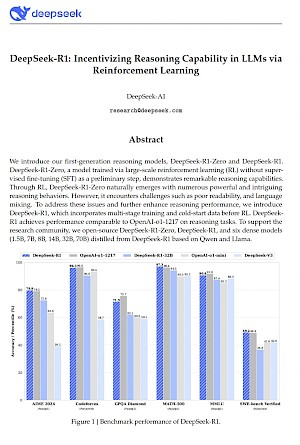
Article "DeepSeek-R1: Incentivizing Reasoning Capability in LLMs via Reinforcement Learning"
Of course, data will continue to play an incredibly big role, but imagine with me: if I need $100 billion to do something you do with $5.7 million, you will agree with me that I have a big problem on my hands, right?
This is what is happening now.
This revolutionary AI system challenges the traditional view that large-scale infrastructure and investment are necessary for building competitive AI models.
The implications of DeepSeek's success could go beyond just the tech world. Recently, researchers at Stanford University built an LLM that has the potential to compete with OpenAI o1 with just $50. Be mindful that this is not a typo.
Let me write it again: fifty U.S. dollars.
If this model proves to be as effective as it seems, it could reshape AI project management by lowering barriers to entry, making it easier for small startups to compete with the giants.
The news has already made an impact on tech stocks, with companies like Nvidia and Microsoft feeling the ripple effects.
If you want to know more about this exciting development, I highly recommend checking out the episode of my 5 Minutes Podcast where I discussed this. You can listen to it here:
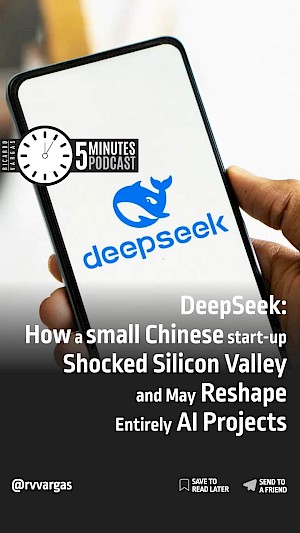
The Future of AI According to World Economic Forum: What We Learned at Davos
Recently, a post from the WEF sparked my attention, highlighting the incredible potential of AI and its role in transforming industries.
Dario Amodei, CEO of Anthropic (Claude AI), shared an ambitious prediction: AI could achieve a century of human progress in five to ten years.
The implications of such a statement are profound.
Think about the breakthroughs in healthcare, where AI is already making strides in early detection, personalized treatment plans, and drug discovery.
Or in climate science, where AI models can predict and analyze environmental shifts faster than ever.
Add to this material innovation, where AI-driven research is bringing about new materials with unexpected properties, and it's clear that we are at the beginning of something truly monumental.
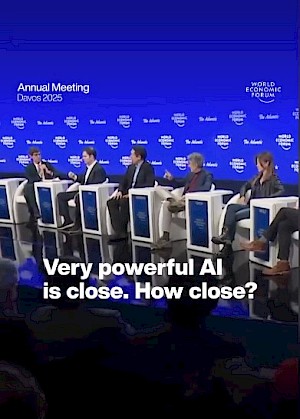
Of course, with great power comes great responsibility.
As AI continues to accelerate, the conversation at Davos also stressed the need for strong ethical frameworks, governance, and workforce readiness.
Balancing the speed of AI advancements with inclusivity and responsibility will be crucial in ensuring that AI benefits everyone—not just those who have the resources to invest in it.
At Davos, experts like Andrew Ng, Yoshua Bengio, and Yejin Choi were vocal about the need for responsible AI deployment, calling for global collaboration to navigate these uncharted waters.
Volatility at Unprecedented Levels
As we navigate to the first weeks of 2025, including some major shifts coming from the new U.S. government and its ripple effects globally, many of our projects were put to the test.
One of the tools I am using to navigate these unchartered waters is the "What-if" analysis. It has helped me plan for potential scenarios and build more resilient projects.
Aiming to support project managers on this task, I recorded an entire episode of my 5 Minutes Podcast covering this. You can listen to the episode in the link below.
Using What-if Analysis to Manage Projects in Extremely Volatile Scenarios
In this podcast, Ricardo talks about the importance of what-if analysis in navigating volatile scenarios, such as geopolitical changes or unexpected project disruptions. By anticipating potential challenges—like new taxes, supply chain issues, or key team members leaving—project managers can develop contingency plans to adapt quickly. Ricardo highlights that dismissing unlikely scenarios can be dangerous, as even improbable events can occur. He stresses reducing project lifecycles to minimize exposure to volatility and using what-if scenarios to stay prepared. Ultimately, adaptability and proactive planning are essential for managing projects in uncertain environments.
Tune in to the podcast to learn more!
Quick Announcements
The Future of Project Management – AI, Emerging Tech & Transformation (Pre-Survey)
As part of our efforts to understand the context of AI in Project Management, we are releasing a quick survey to help frame our 2025 research. We all know that project management is at a pivotal moment, with artificial intelligence, digital transformation, and emerging technologies reshaping how organizations plan, execute, and deliver value. As AI-driven decision-making, digital twins, blockchain, and hyperautomation gain momentum, project leaders must rethink their strategies, tools, and skills.
To explore these shifts, Antonio and I are conducting a 3-minute pre-research survey to identify the most pressing challenges and opportunities in technology-driven project management.
Your insights will help shape the future of our research, discussions, and publications.
You can participate in the survey using the link below.
The Future of Project Management – AI, Emerging Tech & Transformation (Pre-Survey):
"Project management is at a pivotal moment, with artificial intelligence, digital transformation, and emerging technologies reshaping how organizations plan, execute, and deliver value. As AI-driven decision-making, digital twins, blockchain, and hyperautomation gain momentum, project leaders must rethink their strategies, tools, and skills."
To explore these shifts, we—Ricardo Vargas and Antonio Nieto-Rodriguez—are conducting this pre-research survey to identify the most pressing challenges and opportunities in technology-driven project management. Your insights will help shape the future of our research, discussions, and publications.
As a token of our appreciation, we will randomly select one respondent to receive a free seat at our next masterclass!
Don’t miss this opportunity to contribute to the research and be part of the conversation.
New Partnership with Coworked and the Launch of Harmony: Your AI Project Manager
I'm thrilled to share some incredible news with all of you!!!
Antonio Nieto-Rodriguez and I have officially joined the advisory board of Coworked (Techstars' 24), stepping into the role of strategic advisors.
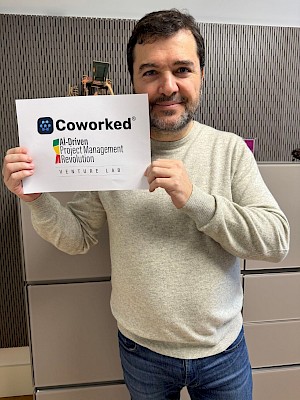
Announcing the partnership with Coworked
This partnership marks a significant milestone in our mission to drive AI-powered innovation in project management.
Our collaboration is part of a larger initiative within the AI-Driven PM Venture Lab, where we're committed to revolutionizing how projects are managed and executed globally.
At the center of this alliance is Harmony, Coworked's groundbreaking AI tool that has the potential to completely transform the project management landscape.
But Harmony is more than just a tool – it's a true game-changer.
By using AI-Agents and integrating with a variety of tools, it takes over the mundane, repetitive administrative tasks, giving project managers more time to focus on leadership, strategy, and delivering value.
This is the kind of innovation our profession has been eagerly awaiting, and we're honored to be at the forefront of it.
After months of close collaboration, Antonio, Shawn Harris (CEO of Coworked), and I are excited to officially announce this partnership, as we believe we're now in a position to reshape the project management industry for the better.
You can learn more about Harmony here.
Exciting Updates on AIPM Certification and Unmissable Opportunities
As we are on our fast-paced journey to 300 certifications globally, Antonio Nieto-Rodriguez and I just finished a major update in the AIPM prep material and exam, making your studies more effective and the exam more aligned with the latest trends.
To celebrate this enhanced certification, we partner with APMG, the global exam platform used for our credential, to offer a limited-time discount on our upcoming masterclass, our certification, and the bundle certification + masterclass.
The next masterclass is scheduled for March 25th and 26th, 2025, and you can register with a $100 discount using the code AI-AGENTS during your checkout at the registration page.
This is your chance to explore the future of project management and learn directly from us how AI can revolutionize how we manage projects.
We've also created an exclusive bundle deal for just $699, which includes the newly upgraded AIPM certification plus access to the masterclass. You can use the same coupon (AI-AGENTS) to benefit from the special price.

We're very excited about these updates and the agreement with APMG that allowed us to make the certification and the masterclass more accessible to all.
Stay tuned for more details about our efforts and AI, and as always, feel free to reach out if you have any questions.
We are working hard backstage to prepare some exciting initiatives to be shared with all of you soon.
Your Voice Matters!
You can also read the previous issues here.
If you have any suggestions, comments, or anything else to help me improve the e-newsletter, please message [email protected]. I would love to hear from you.
Please share this newsletter with your friends, colleagues, and other people you may find will benefit from it.
They can also subscribe to receive it here.
Thanks for your support, and I hope it was helpful to you.
Cheers,
Ricardo

